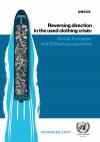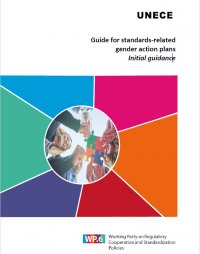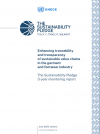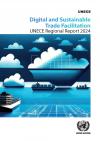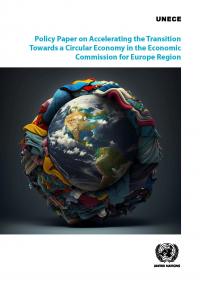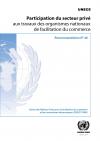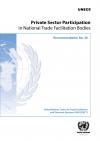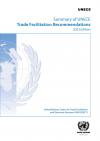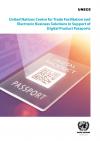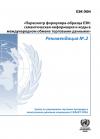Publications
Displaying Results 1 - 20 of 281
- English
This multilingual glossary (English, French, Russian and Spanish) provides a non-exhaustive list of terms related to gender and trade. Trade in general can contribute to improving the living standards of individuals. Specific policies aimed to better integrate women into international trade and support women’s economic activity will enable women to move into higher-skill work, gain economic
- English
The textile industry has evolved from a production model based on natural fibres and protectionist policies for local industry to a model where synthetic fibres have become pervasive, production has been offshored, and the speed of manufacture and distribution of products has increased rapidly. Most of the fashion industry operates under the fast-fashion model, which involves more collections per
- English
Preface - Elisabeth Türk, Director, Economic Cooperation and Trade, UNECE
A circular economy is an economy where (i) the value of materials in the economy is maximised and maintained for as long as possible; (ii) the input of materials and their consumption is minimised; and (iii) the generation of waste is prevented as well as negative environmental impacts reduced throughout
- English
This document provides guidelines to describe the best practices of coordinated risk management among multiple government agencies through a single window system. It is based on the work of the Group of Experts on Risk Management in Regulatory Systems (GRM), Recommendation V on Addressing Product Non-Compliance Risks in International Trade and the work of the United Nations Centre for Trade
- English
This guide provides a first draft of considerations for standards-related gender action plans (GAP). It is intended to be a starting point for discussion within the Team of Specialists of Gender-Responsive Standards (ToS-GRS). It is expected that this initial guide will be further developed to become a more detailed guide to help bodies to develop their gender actions and GAP.
- English
Risk management is the key method to achieve a balance between facilitating and controlling trade. Unless absolutely every single shipment is to be physically verified, agencies will need to establish criteria to choose which shipments to control and which shipments not to control. This will be through risk management. This publication brings together the core concepts of risk management as it
- English
International harmonization and interoperability of regulations of products with embedded artificial intelligence (AI) or other digital technologies is a challenge for regulators, but essential in order to achieve regulatory objectives, while avoiding unnecessary technical barriers to trade and multiplication of conformity testing. This task is complicated by the fact that products with embedded
- English
“The Sustainability Pledge 3-year monitoring report” presents the results of monitoring activities conducted in the context of the United Nations Economic
Commission for Europe (UNECE)’s Call to Action, the Sustainability Pledge1. The Call to Action was launched in 2021 under the initiative “Enhancing transparency and traceability for more sustainable value chains in the garment and footwear
- English
The fifth United Nations Global Survey on Digital and Sustainable Trade Facilitation, jointly conducted by the five United Nations Regional Commissions and UNCTAD, offers an in-depth and comparative analysis of the implementation of 60 trade facilitation measures in over 160 countries worldwide in 2023. Aside from measures in the WTO TFA, the survey covers the implementation of cutting-edge
- English
This policy paper reviews the state of play of traceability and transparency approaches in three economic sectors critical to the circular transition in the ECE region: the agrifood, garment and footwear, and minerals sectors. Moreover, it provides an overview of the challenges and opportunities for advancing the circular economy and highlights successful practices from the whole region. Lastly,
- English
Метрология обеспечивает единство измерений и их метрологическую прослеживаемость к единицам Международной системе единиц (СИ). Это позволяет производителям выпускать продукцию с большей точностью, быстрее и более высокого качества. Метрология является краеугольным камнем международной стандартизации и инфраструктуры обеспечения качества в целом, что содействует упрощению торговли. Данная
- English
La métrologie garantit l’uniformité des mesures et leur traçabilité dans le Système international d’unités (SI). Elle permet aux fabricants de créer des produits de meilleure qualité, de manière plus précise et plus rapide. Pierre angulaire de la normalisation internationale et de l’infrastructure qualité en général, elle contribue à faciliter les échanges commerciaux. La présente recommandation
- English
Metrology ensures the uniformity of measurements and
their metrological traceability to the International System
of Units (SI). It allows manufacturers to produce products
more accurately, more quickly and to a higher standard.
It is the key cornerstone to international standardization
and the quality infrastructure in general, which contributes
to the facilitation of trade.
This recommendation
- Français
L’objet de la présente recommandation est de sensibiliser les pouvoirs publics à la nécessité de faire participer activement le secteur privé aux travaux des organismes nationaux de facilitation du commerce (ONFC) afin de rendre ces derniers plus pertinents, plus légitimes et plus performants. Dans la Recommandation no 4 de la Commission économique pour l’Europe (CEE), initialement
- English
The purpose of this recommendation 48 (ECE/TRADE/479) is to communicate to governments how important the active engagement of the private sector is in national trade facilitation bodies (NTFBs) for strengthening their relevance, legitimacy and performance. The United Nations Economic Commission for Europe (ECE) Recommendation No. 4, originally approved in 1975 and revised in 2015, stressed that
- Pусский
Цель данной рекомендации состоит в том, чтобы довести до сведения правительств, насколько важным является активное участие частного сектора в работе национальных органов по упрощению процедур торговли (НОУТ) в целях повышения их значимости, легитимности и эффективности. В Рекомендации Европейской экономической комиссии Организации Объединенных Наций (ЕЭК) № 4, первоначально утвержденной в 1975
- English
This publication (ECE/TRADE/475) provides the following information on each recommendation:
Brief description
Equivalent ISO standard number (where appropriate)
Current status, indicating whether the recommendation is under development, approved or under revision
Dates and publication numbers of documents containing the first approved and last revised versions of the recommendation
- English
Digital tools can play an important role in accelerating the shift to a circular economy. Digital tools can increase transparency along value chains and provide information, which in turn can help to extend the lifecycle of products.
Digital Product Passports (DPPs), for example, can inform consumers and businesses about products, materials, the conditions under which they are produced and their
- Pусский
Рекомендация № 2 Европейской экономической комиссии (ЕЭК) Организации Объединенных Наций была первоначально утверждена одновременно с Рекомендацией № 1 ЕЭК «Формуляр-образец Организации Объединенных Наций для внешнеторговых документов», чтобы подчеркнуть важность четкого определения используемой в документах информации и рекомендовать применение перечней кодов, когда это
- Français
La Recommandation no 2 de la Commission économique pour l’Europe (CEE) a été initialement approuvée en même temps que la Recommandation no 1 intitulée « Formule-cadre des Nations Unies pour les documents commerciaux » afin de souligner qu’il importait d’arrêter une définition univoque des informations figurant dans les documents et de recommander l’utilisation de listes de

